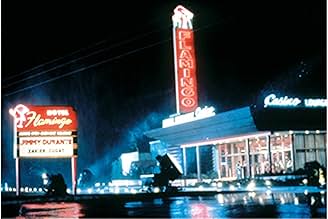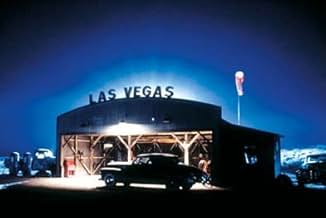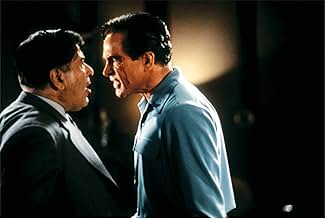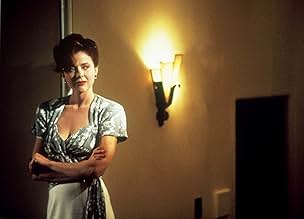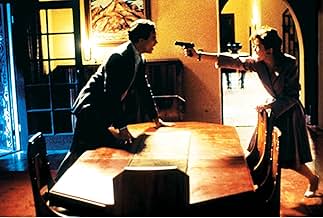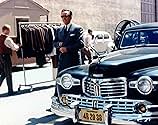अपनी भाषा में प्लॉट जोड़ेंThe true story of gangster Benjamin "Bugsy" Siegel, his tumultuous affair with the tough-talking Virginia Hill, and how he founded the Nevada-based city that would go on to be known as Las V... सभी पढ़ेंThe true story of gangster Benjamin "Bugsy" Siegel, his tumultuous affair with the tough-talking Virginia Hill, and how he founded the Nevada-based city that would go on to be known as Las Vegas.The true story of gangster Benjamin "Bugsy" Siegel, his tumultuous affair with the tough-talking Virginia Hill, and how he founded the Nevada-based city that would go on to be known as Las Vegas.
- 2 ऑस्कर जीते
- 12 जीत और कुल 41 नामांकन
- Jack Dragna
- (as Richard Sarafian)
फ़ीचर्ड समीक्षाएं
The story of Bugsy Siegel is indeed a true story. Siegel was a New York Jewish gangster, who moved out to L.A., and one thing led to another and resulted in Bugsy building the Flamingo hotel and casino in the middle of the desert. This is the man who put Las Vegas on the map. Bugsy (by the way, don't call him Bugsy to face) is very insane. Also, Kingsley's character gets to introduce Bugsy's tragic flaw: he doesn't "respect" money. This combination makes one very unique mobster that I can not compare to any other. Just wait for the scene relating to dogs and pigs; I don't want to reveal anymore because this is where Beatty shines.
Virginia Hill (Bening) is a cookie cutter actress going steady with one of Siegel's or somebody else's soldiers. Bugsy starts to look fondly on her, and thus starts the romance. There should be no surprise whatsoever since they're married in real life, but Beatty and Bening do have great chemistry on screen. Their relationship brings out a lot of fun in the film.
Again, Bugsy is a tragedy. I don't think that's spoiling it since you can learn that somewhere on the Internet, but I do want to let you know what you're getting into. It is a very interesting story with a few laughs and some irony here and there. Barry Levinson made a well-constructed film that flows very nicely and only lacks where I assume the screenplay does. I would not say it is at the caliber of Goodfellas or The Godfather Trilogy, but, all in all, it is a pretty decent movie.
I highly recommend that you definitely see it.
So Beatty portrays Ben Siegal as a sociopathic gangster whose curse is that he is a dreamer who is careless with money. He somewhat dreams of being in pictures and enjoys the glamor of Hollywood, but ultimately dooms himself when he falls in love with an idea - building a casino in the middle of nowhere in Nevada, where prostitution and gambling are legal. He argues to his mob investors that they can be 100% legitimate. And if they decide to be less than 100% legitimate, he figures controlling the gambling interests in a state where it is legal and at that point - the 1940s - unexploited, he can eventually control the state.
The other decision he makes that dooms himself is getting involved with Virginia Hill (Annette Bening), a kindred spirit in all the wrong ways. They fight violently, make up violently, and she ultimately gets grabby with the mob money that is the construction funds for the Flamingo. This was a very versatile role for Annette Bening as Hill, and is probably the best thing she ever did. She was slated to be Cat Woman in a film the following year, but she managed to do something much more remarkable - actually get Beatty to enter into matrimony - an institution he had skillfully avoided up to that point - in a union that yielded four children. And she also appears to be the model for the Columbia Lady with a Torch - although everybody denies it in spite of Beatty's heavy investment in Sony/Columbia.
Other interesting performances - Ben Kingsley as the low key Meyer Lansky. In spite of being a Best Actor Oscar winner, that honor never really paid off for him in break-out roles. Elliott Gould as the hapless Harry Greenburg. Honestly, you rat on the mob and another member of the mob asks you to go for a ride and you say you love riding in the night air? The underrated Joe Mantagna as just "George". Since "George" was starring in the film "Manpower" that was shooting as Bugsy looks on, that had to be George Raft. Were they afraid the Raft estate would sue, and who exactly is the Raft estate since Raft never had any kids?
Finally, not so much an interesting performance but an interesting vignette - Bugsy walks up to singer/actor Lawrence Tibbett's house and pays him sixty thousand in cash for it. Like so much of the movie, this never happened. But Tibbett's kids did object to the portrayal of their dad as a short elderly overweight wimpy guy. But somehow, the film makers were NOT afraid of the Tibbett estate!
The one thing that annoyed me about this film - the score by Ennio Morricone. It never breaks out into any particular kind of mood, and it sounds enough like one of Morricone's other scores - the one for The Untouchables - that it sounds like if it were to take off it would sound exactly like that score.
Despite many liberties taken against the historical record of what occurred and a number or made-up scenes that are hard to fathom, the movies tries at times to follow close to what was known at the time but the lack of attention to detail keeps getting in the way.
Beatty does a great job acting in the film and his chemistry with his future wife Annette Bening is something to behold.
I don't mind so much that Beatty is about 15 years older than Siegel was during these years but it's more upsetting that Virginia Hill (Benings character) is portrayed as a street tough city girl when she was a street tough country girl from Alabama.
Mickey Cohen was in his early 30s but is portrayed as a hardened criminal in his late 40s to early 50s. Also the background story on his relationship with Siegel is tangled up here.
The movie does drag on at times and there are some absurd scenes which never would have happened.
Beatty is at his best playing the family man - his charisma carries the picture but they couldn't even get the ending to be accurate historically which kind of defeats the purpose of making a biopic movie.
क्या आपको पता है
- ट्रिवियाThis movie shows Bugsy Siegel watching a screentest of himself. In real life, Siegel made many friends amongst the Hollywood elite, asked for, and had a screentest. The footage no longer exists, like so many other screentests, yet the legend of Siegel's attempt to break into showbiz lives on.
- गूफ़When "selling" the concept of Las Vegas to the other mobsters, Bugsy states that "when Hoover Dam opens up", there will be power for air conditioning. The scene takes place in the mid 1940's and Hoover Dam had already been producing power since the late 1930's. In addition, Las Vegas never got any power from Hoover Dam until 2017.
- भाव
"Bugsy" Siegel: Twenty dwarves took turns doing handstands on the carpet. Twenty dwarves took turns doing handstands on the carpet. Twenty dwarves took turns doing handstands on the carpet...
- इसके अलावा अन्य वर्जनThe 2006 DVD features fifteen minutes of extra footage that Barry Levinson had to cut from the 1991 theatrical version.
- कनेक्शनEdited into 5 Second Movies: Bugsy (2008)
- साउंडट्रैकAc-Cent-Tchu-Ate the Positive
Written by Johnny Mercer & Harold Arlen
Performed by Johnny Mercer
Courtesy of Capitol Records
By arrangement with CEMA Special Markets
टॉप पसंद
- How long is Bugsy?Alexa द्वारा संचालित
- What's the title of the movie that George Raft (Joe Mantegna) invites Ben to come watch him film?
- What are the differences between the theatrical version and the Extended Cut?
- Why did Ben say he was going to name the Flamingo after Virginia?
विवरण
- रिलीज़ की तारीख़
- कंट्री ऑफ़ ओरिजिन
- भाषा
- इस रूप में भी जाना जाता है
- Tên Cướp Bugsy
- फ़िल्माने की जगहें
- उत्पादन कंपनियां
- IMDbPro पर और कंपनी क्रेडिट देखें
बॉक्स ऑफ़िस
- बजट
- $3,00,00,000(अनुमानित)
- US और कनाडा में सकल
- $4,91,14,016
- US और कनाडा में पहले सप्ताह में कुल कमाई
- $1,40,358
- 15 दिस॰ 1991
- दुनिया भर में सकल
- $4,91,14,016
- चलने की अवधि2 घंटे 16 मिनट
- रंग
- पक्ष अनुपात
- 2.35 : 1
इस पेज में योगदान दें




